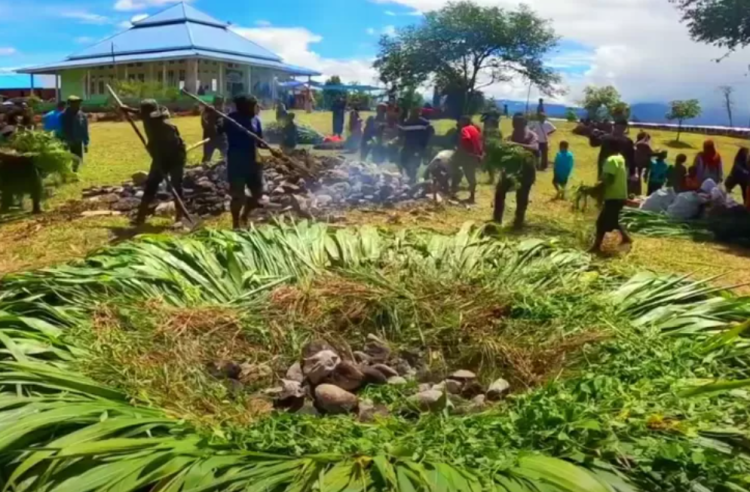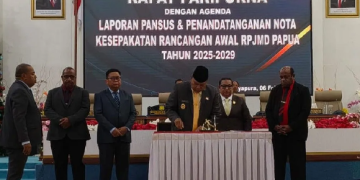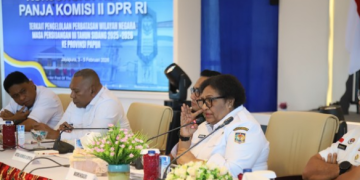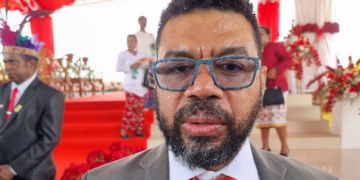Papuaaround.com – In the heart of Papua, a rich tradition of cultural and spiritual significance endures: the Bakar Batu ritual. This event is not merely a culinary festivity but a powerful symbol of unity, cooperation, and gratitude to both ancestors and nature.
The Bakar Batu ritual involves cooking meat and vegetables using heated stones. These stones are first warmed over a large fire and then layered with food in a pit lined with leaves. The slow cooking process produces a unique aroma, flavor, and meaning, symbolizing the warmth of social bonds within the community.
Traditionally, Bakar Batu is held to mark significant events such as births, weddings, or victories. In today’s modern era, the people of Papua continue to preserve this tradition as a deep expression of pride in their cultural identity. Beyond honoring their ancestors, Bakar Batu strengthens social ties among the clans that participate.
Participation in this ritual exemplifies the strong communal spirit within Papuan society. Every person in the community has a role, whether gathering stones, preparing ingredients, or assisting with the cooking process. Men, women, young, and old all contribute, making this more than just a culinary ritual—it’s a testament to the community’s unity.
This communal involvement emphasizes that Bakar Batu is a profound expression of togetherness. Tribes use this occasion to resolve disputes, reinforce familial bonds, and teach younger generations about the value of harmony. Each stage of the ritual is accompanied by traditional prayers and songs, expressing gratitude to God and the ancestors for their blessings.
Read also: The Legend of Creation! Papua’s Deep Connection to Nature
Bakar Batu is not just a local tradition; it’s also an attractive cultural experience for visitors. The Papua regional government, in collaboration with various partners, has promoted Bakar Batu as part of the region’s cultural wealth, inviting tourists to experience it. The uniqueness of this ritual draws both local and international travelers seeking an authentic connection with the people of Papua.
Many visitors are captivated by the friendliness and unity fostered through this ritual. They are encouraged to join the cooking process, interact with locals, and enjoy the communal meal—a truly immersive experience reflecting the respectful and appreciative nature of Papuan society.
By preserving Bakar Batu, the people of Papua not only honor their ancestral heritage but also create economic opportunities. Cultural preservation efforts can boost local incomes, especially through cultural tourism, as Bakar Batu becomes a symbol of hospitality and tradition.
The ritual also showcases the bounty of Papua’s natural resources, using local produce such as cassava, sweet potatoes, and indigenous vegetables. These ingredients, simple yet rich in variety, demonstrate the abundance of Papua’s land.
Yosep Wamena, head of the Papua Tourism Office, stated, “Bakar Batu is an essential tradition for the Papuan people. We are committed to supporting the preservation of this ritual, as we want tourists to experience not only Papua’s natural beauty but also the depth of its culture.”
In this globalized world, Bakar Batu teaches the importance of cultural roots. Respecting customs, appreciating others, and fostering togetherness are values passed down through each layer of heated stone. Behind the simplicity of this ritual lies a profound message of unity and mutual support.
By keeping Bakar Batu alive, the people of Papua safeguard a rich ancestral heritage while building a cultural bridge connecting Papua to the world.











